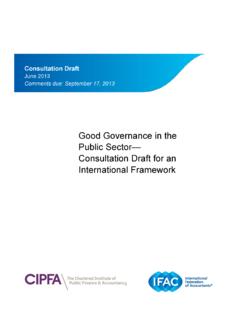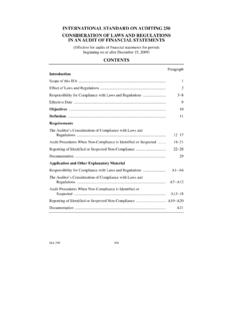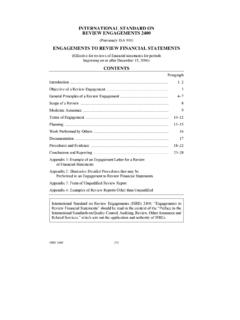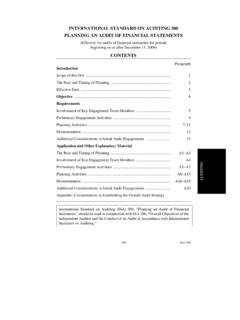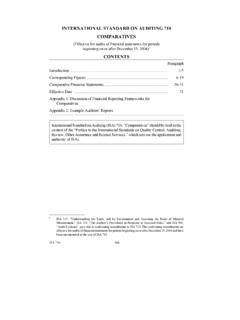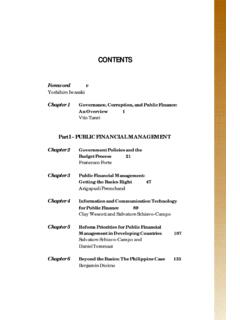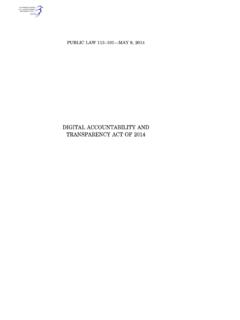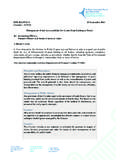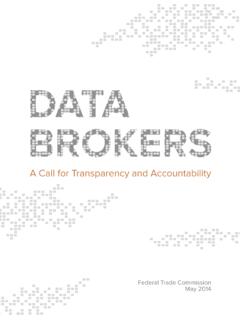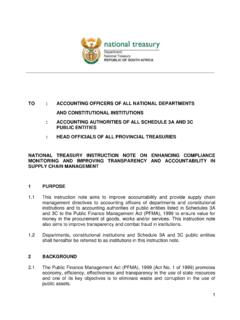Transcription of PUBLIC SECTOR FINANCIAL MANAGEMENT …
1 1 PUBLIC SECTOR FINANCIAL MANAGEMENT transparency AND accountability : THE USE OF INTERNATIONAL PUBLIC SECTOR ACCOUNTING STANDARDS Governments must implement the necessary institutional arrangements required to enhance PUBLIC SECTOR FINANCIAL MANAGEMENT transparency and accountability . An integral and essential part of these arrangements is the use of accrual-based accounting through the adoption and implementation of International PUBLIC SECTOR Accounting Standards (IPSASs) which promotes greater transparency and accountability in PUBLIC SECTOR finances and allows for enhanced monitoring of government debt and liabilities for their true economic implications.
2 Introduction Over the years there have been many sovereign debt defaults and write-downs taken by investors in PUBLIC debt. In the 21 years to 2011, there were 25 sovereign debt restructurings. The sovereign debt crisis engulfing the European Union in 2010-2012 and related government debt issues affecting the United States, and potentially other countries around the world, are cause for major concern. The problems highlighted by sovereign debt crises include the lack of transparency and accountability of governments, poor PUBLIC finance MANAGEMENT and PUBLIC SECTOR FINANCIAL reporting, and the deficiency of institutions for fiscal MANAGEMENT in many countries.
3 These institutions create neither the constraints nor the incentives for governments to manage their finances in a manner that protects the PUBLIC interest and also protects investors. IFAC is of the view that governments around the world must implement the necessary institutional arrangements to protect the PUBLIC as well as investors in government bonds. It is critical that governments work to establish greater trust between themselves and their constituents; this should be one of the highest priorities for national leaders and PUBLIC officials. To establish such trust, it is important that governments provide accurate and complete information on expenditures and transactions, in order to demonstrate accountability and stewardship, and to reinforce their own credibility.
4 This means providing clear and comprehensive information regarding the FINANCIAL consequences of economic, political, and social decisions. This information must also focus on the longer term impact of decision making; something that cannot be achieved through the reporting and disclosure of only cash flows. Furthermore, given the prominence of banks and private SECTOR investors that hold government debt, there is strong demand for the same level of FINANCIAL transparency and accountability from the PUBLIC SECTOR as is expected from the private SECTOR . The type of information required can only be provided through a high-quality, robust, and effective accrual-based FINANCIAL reporting system, which allows for government assets and liabilities (including debt) to be appropriately recorded, reported, and disclosed and hence effectively monitored.
5 The most globally accepted high-quality accrual-based FINANCIAL reporting system is IPSASs. IPSASs provide for the full disclosure of all assets, liabilities, and contingent liabilities, which is vital for assessing the true economic implications of PUBLIC SECTOR FINANCIAL MANAGEMENT . The disclosure of all liabilities, including long-term obligations ( , pension obligations), also may encourage government leaders to make decisions that are driven by matters other than short-term political incentives. IFAC POLICY POSITION 4 March 2012 2 PUBLIC Interest Governments have a responsibility to enact legislation, formulate and implement policy, and deliver products and services to their citizens.
6 The decisions made and actions taken in fulfilling these ambitions should be undertaken in the PUBLIC interest. Indeed, there is political accountability on the part of governments to ensure that they do act in the PUBLIC interest. Governments have coercive powers to tax. Monies raised through taxation are allocated to spending, both recurrent ( , paying wages to PUBLIC SECTOR employees) and capital ( , spending on major infrastructure projects, such as roads and railways), for the benefit of the country and its citizens. This responsibility obliges governments to discharge their accountability by demonstrating the manner in which they have effectively and efficiently used the resources at their disposal.
7 Additionally, where governments have shortfalls between amounts raised through taxation and amounts outlaid as government spending, they raise funds through debt markets. Where this is done, governments have a PUBLIC interest obligation to market participants investors and potential investors to provide timely, reliable, and detailed information of their FINANCIAL performance and positions in the same way that listed companies have obligations to equity market participants. However, without robust, transparent, and accountable arrangements for FINANCIAL reporting and FINANCIAL MANAGEMENT , it is not possible to reliably assess whether decision making by governments has been in the PUBLIC interest.
8 Furthermore, it is unlikely that governments will be able to adequately discharge their accountability , and provide the standard of information required by investors, without being able to publicly report and disclose high-quality FINANCIAL information. It is, itself, a major PUBLIC interest concern that strong FINANCIAL reporting and FINANCIAL MANAGEMENT arrangements are not in place in many countries around the world. The implications of not having appropriate systems in place include: a potential failure by government to deliver services and products in the most effective and efficient manner, and in a way that maximizes sustainable social benefit; making decisions to invest, or not invest, today in projects and programs that result in foregone potential benefits, and which represent an opportunity cost where citizens in the future will pay for the mismanagement of today.
9 And poor decision making that may be, at best, made with a short-term focus or, at worst, made in the self-interest of politicians and PUBLIC servants who have incentives to operate in a particular fashion. Context: PUBLIC SECTOR FINANCIAL MANAGEMENT PUBLIC FINANCIAL MANAGEMENT is defined by The Chartered Institute of PUBLIC Finance and Accountancy (CIPFA) as the system by which FINANCIAL MANAGEMENT resources are planned, directed and controlled to enable and influence the efficient and effective delivery of PUBLIC service goals. 1 CIPFA describes PUBLIC FINANCIAL MANAGEMENT in terms of a whole system approach. IFAC supports a whole system approach to PUBLIC SECTOR FINANCIAL MANAGEMENT , and recognizes the critical importance of the foundations of the system stakeholder consultation, the demand for services and projects, and 1 CIPFA, PUBLIC FINANCIAL MANAGEMENT : A Whole System Approach, Volume 1, 2010, page 5 3 governance2 which, along with the key process elements, aims to deliver PUBLIC , community, and individual value as part of the overall objective to deliver sustainable social benefit.
10 For the purposes of this position paper, IFAC is focused on aspects of two of the key process elements: namely, standards and assurance. IFAC supports the use of high-quality FINANCIAL reporting standards for the PUBLIC SECTOR that allows for independent assurance. Also, the use of high-quality FINANCIAL reporting standards requires the implementation of primary institutional arrangements to support their effectiveness, as a tool for enhanced PUBLIC SECTOR FINANCIAL MANAGEMENT . Use of International PUBLIC SECTOR Accounting Standards (IPSASs) IFAC supports the global adoption and implementation of IPSASs for PUBLIC SECTOR FINANCIAL reporting. A key issue for PUBLIC SECTOR FINANCIAL reporting is that most governments still adhere to the cash basis of accounting, and therefore provide minimal disclosures relative to what the PUBLIC , banks, investors, and credit providers generally expect of the private SECTOR .

